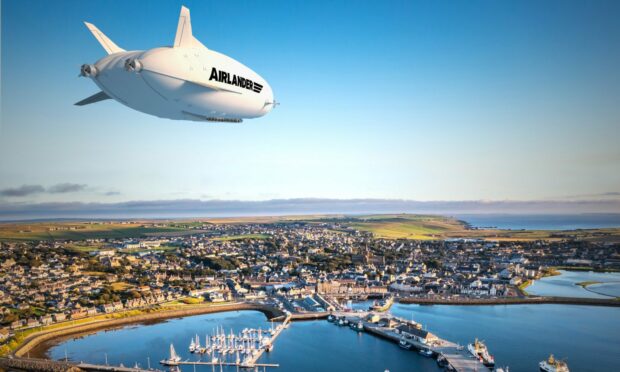A plan to test green aviation technology in the Highlands and Islands such as airships and unmanned electric aircraft has been lifted by a £1.7 million grant.
Three new partners have joined the Sustainable Aviation Test Environment (Sate) project based at Kirkwall Airport on Orkney.
Bedford-based Hybrid Air Vehicles (HAV) has been developing the Airlander 10 – thought to be one of the largest aircraft in the world – for more than 10 years.
The firm, which is famously backed by aviation enthusiast and Iron Maiden lead singer Bruce Dickinson, recently commissioned research into how the helium-filled ships can be used for passenger transport and freight in the Highlands and Islands.
ARC Aero Systems, another Bedford-based company, is aiming to test how its unmanned electric vertical take-off and landing (eVTOL) aircraft can be used to support the needs of rural Scotland, such as mail deliveries, fisheries, oil and gas and windfarms.
Netherlands-based Cormorant SEAplanes will take part in the project to develop a “flying proof-of-concept” for its electric, 7-seat amphibious aircraft.
Last year the Sate project bagged £8.9 million of funding from the government-backed body UK Research and Innovation (UKRI) as part of its “future flight challenge”.
The latest cash injection marks the next phase of development for Sate which was established in 2020, in a project led by Highlands and Islands Airport (HIAL).
HIAL managing director Inglis Lyon said the project supports its “long-term vision to become a net-zero carbon regional airport group”.
He said: “The addition of these new technology partners will help us take a step closer to real solutions for the future of sustainable aviation.“
Chris Rijff, managing director of Cormorant SEAplanes said opportunties from participating in Sate “cannot be over-emphasised”.
He said: “Sate provides an ideal, practical developmental ecosystem with opportunities for working together so that we can progress toward realising a sustainable, air transport solution for remote community needs.
“Beyond this current, short-term project, we are looking to develop our flying proof-of-concept within the favourable development environment provided in Scotland – where significant market potential is apparent for Cormorant.”
HAV CEO Tom Grundy said: “We think of Airlander as the world’s most efficient large aircraft. It is a game changer for regional air transportation.
“We are excited to demonstrate how our technology can contribute to a greener and more connected future in the Highlands and Islands and, in time, around the world.
“With the support of the Sate project and our fellow technology partners, we are confident that we can make a significant impact in advancing the next generation of air services in this wonderful part of Scotland.”
Dr Seyed Mohseni, CEO of ARC Aerosystems, added: “This project will enable ARC Aerosystems to demonstrate and test our UAV capabilities within CAA regulatory requirements. It will support in creating system proved flight evidence at the first stage of our UK flight trials.”



Conversation